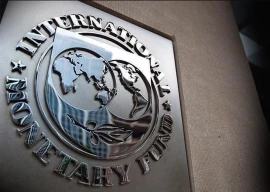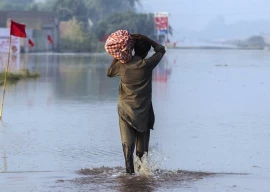
The Chenab Group of Industries would want to forget the year 2007.
Considered as one of the leading manufacturers of textile goods in the past, Chenab Group owns Chen One – Pakistan’s first home textile brand having 29 branches in the country and abroad. The Group also owns and manages several other companies such as CGI Limited UAE, InterFab in Australia, Chenab Fibres Limited, ChenSoft, Chenab USA, ChenOne Worldwide, House of Chenab and ChenOne Foundation.

The CEO recalled 2007 as the year that set the downfall in motion, citing the riots that followed the assassination of former prime minister Benazir Bhutto as one of its reasons. PHOTO: IMRAN RANA/EXPRESS
Once a shining star, boasting annual sales of Rs9 billion, the Group’s slide began seven years ago. While it is desperately looking to claw its way back, lack of working capital is proving to be a massive hindrance.
In 2006-07, Chenab Limited recorded sales over Rs9 billion and was eyeing the Rs15-billion mark by the following year. Suffice to say that the dream never bore fruit as various issues caught the Group off guard.
Mian Latif, the chief executive officer, was asked the reasons behind the fall and if the Group could re-emerge from the slide.
Wearing a grim look, Latif began narrating.
Latif’s family had an agricultural background before it established industries. The CEO’s forefathers had moved from what is now a part of India, settling in Toba Tek Singh in 1883.
Fast forward to the 20th century
In 1973, after completing graduation, Latif set up a small-scale business – a power loom factory in Toba Tek Singh. Sixty power looms were installed as the first step was taken towards success. Chenab Textile Mills, the first weaving unit, was setup and marked a big day for Latif.
Two years later, Chenab purchased a sick unit in Faisalabad. The unit was spread over six kanals before Latif expanded to an area of 280 kanals.
The unit started exporting gray fabric and in 1985, exports were worth Rs135 million. In 1995, earnings reached Rs2 billion. In 1998, exports grew to Rs3.5 billion. The earnings helped him clear all outstanding loans.

During 1990 to 2000, he had also purchased another two sick textile units at an investment of Rs300 million.
This was the time when Latif was busy in expanding production capacity. The year 1998 saw the company earn a net profit of around Rs400 million.
By now, Latif had made a name for himself. A good reputation followed in the international market including Europe, UAE and Australia but the dream was to penetrate the US.
Latif went after the dream. What ensued was knocking on the doors of banks in search for loans. Production capacity had to be increased and hence, heavy machinery was imported.
By 1998, Latif introduced Chen One in Pakistan and abroad.
The CEO recalled that, at the time, flow of capital was not an issue. State-of-the-art machinery was imported as quality assurances were given to the international market. That was the only way to penetrate.
Even today, the Group has the distinction of owing 24-colour Rotary machines in Pakistan, labelled the best manufacturing machines in the world.
In 2004, the Chenab Group purchased another industry where Latif installed the Chen One furniture factory. This was and remains the first automatic furniture plant in Pakistan.
In 2004-05, exports grew to Rs5 billion, Rs6 billion a year later before reaching its peak in 2006-07. Exports were increasing and the company, on a high, set a target of Rs15 billion for next year.
What followed is, as they say, history.
The fall of Chenab Group
In 2006-07, the Group’s long term loan stood at Rs3.5 billion.
“It was not a big issue for the Chenab Group to payback the loans to the banks,” said Latif. “The Group’s bank record was remarkable and it never delayed paying loan instalments to banks.
“But, October 15, 2007 was the date when ship started sinking.”
During the time, load-shedding was at a minimum. The period between October to January is considered a peak season for the textile industry.
“This is the time when we have to deliver our textile orders for Christmas and the New Year. We strive to fulfil our commitments at any cost.”
At the time, the Group had bulks of textile orders from world’s biggest stores.
The factories suffered the first setback when they faced gas cuts from October 15, 2007 to November 1 after a fault in the Qadirpur gas fields, bringing down production.
By the time supply was restored, the damage had been done. The supply chain was broken and Latif said an alternative did not exist. “We did not have an alternate source to produce steam to run our units and that delayed the shipments.
“We were unable to meet deadlines and could not arrange deliveries from the market as not even a single unit in Faisalabad had 24-colour Rotary machines.
“The irony is that the technology and quality assurance that helped the Group flourish became the first hurdle and the first step towards the collapse as well.”
The Group tried to manage alternate sources of energy and arranged to deliver the biggest order to a leading store chain in Germany. “But we missed the orders from America and other countries, causing the Group to pay big penalties.”
They say that it could not get any worse but it did for the Chenab Group.
“We dispatched orders of a German company that owned 1,400 outlets in the country alone. The orders were dispatched in 107 containers and made their way from Faisalabad dry port to Karachi. Out of those 107 containers, only 37 reached Germany.”

The CEO recalled 2007 as the year that set the downfall in motion, citing the riots that followed the assassination of former prime minister Benazir Bhutto as one of its reasons. PHOTO: IMRAN RANA/EXPRESS
The reason was the assassination of Pakistan People’s Party Chairman Benazir Bhutto in December that year, which resulted to riots across the country. The remaining containers could not be delivered on time and the German company filed a case and won €5 million in damages.
“As many as 37 containers were returned to Chenab Group after a year. We had to bear huge losses.”
During 2007-08, the Group sustained Rs4 billion in losses. “We tried to convince banks to give working capital but the banks refused to deal with us,” said Latif.
He said Chenab was making interest payments till 2010 but no bank was willing to issue working capital.
The entire loan portfolio became Non Performing Loans (NPL).
“I tried talking to banks but they refused to extend financing. Last year [2013], two banks rescheduled the loan for working capital of Rs370 million on terms that the Group will pay interest on the new rescheduled loan and 7% from the NPL capital amount. In this agreement, we would NPLs in the next 10 years.”
Answering a question, he said three banks filed cases against the Group, seeking an auction. “But, we said we are ready to pay the loans if the banks re-considered their terms and conditions.”
Latif added that Chenab owes the banks Rs9 billion and the value of the Group is far higher than this.
“The Group needs just Rs2 billion for working capital and we can re-start from our previous position within a year but no bank is willing to come forward,” said a dejected Latif.
Currently, the Chenab is operating at less than 25% capacity with 3,000 employees, supplying goods to Chen One stores and meeting requirements of a few international ones.
“Textiles industries that are still surviving do business in multiple files while Chenab Group was flourishing on the back of processing industries. Exports orders of yarn and gray cloth can be managed from the market but orders comprising garments and home textile products have to be arranged from our own factories.”
The writer is a staff correspondent
Published in The Express Tribune, September 15th, 2014.
Like Business on Facebook, follow @TribuneBiz on Twitter to stay informed and join in the conversation.
COMMENTS (30)
Comments are moderated and generally will be posted if they are on-topic and not abusive.
For more information, please see our Comments FAQ



1725967717-0/Untitled-design-(3)1725967717-0-165x106.webp)













Main reason of downfall non Professional and uneducated people on top posts. involvement in Politics.
Top leadership need to be change, to gain the trust of financial institutions.
@Nida Alvi: The Saigols have had multiple restructurings both with Pak Electron as well as Maple leaf cement. In fact Pak Electron has been part of a cartel according to Siemens colluding with WAPDA to set prices.. Atlas group had a Bank they busted with in house loans. It is now called 'Plummet' Bank.
Nishat Group is a success story though. Hence you are right Family business can work.
When one reads a story like this......its best to take it with a pinch of salt.
@Farooq: The business families in Pakistan (Adamjees, Dewans, Habibs, Mians, Saigols, Valikas etc) were also flourishing like Tata, Birla, Godrej, Ambanis etc. in India but the nationalization done by Z.A.Bhutto in 1973 killed the entrepreneurship and blocked any possibility of domestic or foreign investment in Pakistan.
@Zeeshan: Zardari, Dr. Asim, Khurshid Shah, Makhdoom Amin Faheem, Rehman Malik etc. etc. have been extremely "successful" "businessmen", making billions and billions and billions without a pause, they continue their "business" in Sind province while Nawaz Family do their "business" in center and Punjab.
Very sad story. This is difference between India and Pakistan. In India government support has led to giants like TATA, Reliance and many more
We could not create the same giants in business because of govt policies or attitute towards support. Only shady characters like Malik Riaz or Manshah can exist here
Despite corruption and poverty in India, giant corporations are able to sustain a middle class in India, but things are deteriorating for 7 years continuous
Exports of manufactured goods has become extremely difficult and risky due to mass corruption, energy deficiency and high rates and law and order situation. General Pervez let the vandals loose on rampage for three days after Benazir assassination and the next government of Wadera Corruption Party being criminal and crime friendly did not arrest and get punished even a single criminal involved in mass loot, arson and murders that followed the assassination. Only "businessmen" like Nawaz Sharif and Zardari and their cronies can thrive in this country.
In the end no one loses except the poor schmuck who put his money in the bank expecting a fair decent return.
@Economy: But there was an IPO for Chenab in 2004. The company is listed on KSE...I wonder why the article has not mentioned any of this?
It is an unfortunate situation with Chenab Group. I have visited Chena Group number of times and teh professionalism I experienced was very impressive in country like Pakistan. Chenab Group have excellent reputaiton globally and they can be centre of excellence for Pakistan. Unfortunatly none of the Government made any effort to bail out Chenab Group where as if they were in the west the Government would have made every effort to bring the Group back on its feet. I am sure if Chenab Group was supporting PMLN they would grant every loan possible with its own terms and conditions. I am sure PMLN have eye on Chenab Group and they cant wait to bank corrupt them and buy the Group for pennys. History is witnessed that Sharif family have created this kind of siutations with businessess and bought them for pennys. Family unity is Chebab Group's strength and I am very convinced that they will bounce back. It will be shame and unfortunate for Pakistan if Chenab Group fall.
I don't know why companies in Pakistan go after loans to collect capital rather than having IPO to sell shares in stock market. Perhaps they want to have business empire to themselves. Due to this greed they end up loosing everything they own.
Even now bank would save this Organization, provided the bank it self nominate or Hire a CEO. Mian Sahab, do you really want to save the Ship ?
Even now bank would save this Organization, provided the bank ir self nominate or Hire a CEO. Mian Sahab, do you really want to save the Ship ?
We are facing a Chinese tsunami. They are out competing us. Their costs are lower and they work like ants.
Appears a piece of writting without any research from independent sources, just one side of story. Another reason (in market) which the author didnt mention was Siphoning of funds and diversion of funds to off shore locations, where the group now owns Mills and Factories which are working fine and here they are not paying back. Write it somewhere, next property boom in Pakistan and the borrower will pay back entire amount to get his lands vacated of charges and earn money.
@Chachoo: @Islam: To call this business failure as result of nepotism only is over-simplification of a complex reality. Businesses are, and have been, run successfully by family members. The Memon and Bohra communities (Karachi & Bombay) hire only their close family members at the key positions and have been running their businesses quite successfully from generation-to-generation for centuries. There are numerous examples of successful business ventures that grew from small family businesses. The largest textile group in Pakistan is Nishat Group that is run by the sons & nephews of Mian Mansha. The other successful business conglomerates are Saigols (Pak Elektron), Shirazis (Atlas Group) run by siblings and off-springs. You will always find a well-trained, courteous & professional staff at all outlets of ChenOne. But the failure of Chenab Group is because of greed of Mian Latif rather than anything else as an excuse. All business groups hire qualified professionals for execution of the Vision & Mission given by the sponsor shareholders (i.e., the family members).
Presents a very one sided sob story. No business falls for singular reasons. Given the dirty business sphere in Pakistan, I am sure there is more to this story and @Muslim Leaguer shares some of those details which were glossed over.
Businesses in Pakistan need to learn that they ought to be come professional. This is my hand waving argument! Glosses over lots of stuff!
My learning about the Faisalabadi textile industry has been that even when times are good, they will whine and cry. There is a big Pakistani demographic they can cater to and should start focusing on more. Stop looking outwards.
Joke of the day Mian Muhammad Latif of Chenab Limited (Popularly known as Chen-One) was appointed director of BoP in October 2002. He got loan worth Rs1.24 billion from BoP. He was also removed in 2008. Mian Latif when contacted said when the BoP opened its branch in Faisalabad during his directorship, it was housed in his building for which he never charged any rent. After one year, he said, the BoP approached him saying since the said Faisalabad branch was not doing good business so he should get into business with the Bank. Latif said that on this he agreed but tendered his resignation before getting the loan facility/business limit from BoP BoD membership. He said he had clearly told the BoD that he would not continue as director of the BOP if he gets into business with the bank but his resignation was not accepted. Latif added that he was told that the BoP had got it cleared from the State Bank that he could continue as BoP BoD member. Mian Latif said the BoP loan given to his company is less than Rs1 billion.
Cut of gas supply due to fault in gas-line for a period of 17 days even in the peak season + a penalty of Euro 5.0 M could sink such a sailing ship.....
Can you believe it guys? I am unable to digest ........
Since it was export shipment; those 107 containers must have been insured, so I am not accepting it as a loss.
This article is highly biased and does not show the true face of Chenab Group. The real reason for Chenab's fall is nepotism. All decision making positions are held by family members many of whom are willful defaulters. These family members grew up in luxury and are least bothered about putting a hard days work in the factory. Many visit their offices just once a month as they cant get anytime off from their 'vacationing'. No bank is going to lend them any money.
Who reaches clifftop, step down as well. Its a universal truth.
Hardly a 'news' item to be published on the front page.
@Shuaib Bhat: You think the government cares about the taxpayers?
Loss of an industrialist is a loss of whole nation. Anarchists don't care how much damage they do, nor our protectors understand the importance to eliminate them. Our protectors did nothing in 2007 and don't allow others to do something in 2014.
@Shuaib Bhat: The government cannot be responsible for the financial health of private units. Can you imagine the scandal if the government lost all the money it put in? These group profiles are well researched but I feel they should also present the other side of the story. If it were just an issue of granting working capital no bank would refuse. Lets hear what they have to say.
Nice story by ET but the well known fact is that Mian Latif was one of the 4 Directors of the Bank of Punjab who had illegally obtained related-party loans from the Bank in clear violation of section 19(4) of The Bank of Punjab Act 1989. The 4 Directors were appointed by the then Chief Minister-Chaudhry Pervaiz Elahi as a bribery, when these Directors took money from the Bank to grease the palms of the CM, who took the money to Spain and to other offshore regions. The then Governor, General Khalid Maqbool was also in connivance with these looters and the case is pending with NAB against his son-inlaw. Their cases of misappropriation were filed with NAB http://tribune.com.pk/story/552719/loan-default-bank-of-punjab-sent-83-cases-to-sbp-nab/ and therefore the banks could not reschedule the loans of willful defaulters. Mian Latif, along with Mian Khurram, Mian Gauhar Ejaz and Mian Mughisuddin are perfect examples of how greed destroys genuine businesses in Pakistan!
Very unfortunate and sad story. The Government could give Rs. 2 billion for shares in Chenab Group. The Group's worth will increase many fold and the return on investment could be over 200-300% within 2 years. You see the Group is in a terrible position and the Government can demand more as the group is in a desperate position. I see a golden oppurtunity for our Government to mint money for the taxpayer. Not only that it will also boost our exports. It's a win-win situation, espcially for the taxpayer.
Simply sad how the PPP lead govt screwed such a valuable asset.
One reason that they did not tell is the induction of their family members as the CEO, financial officers and for all top posts in the Chenab group. This has led to the downfall of many groups in Pakistan in the past as well. Big business ventures dont work like that. All big industries around the world hire very professional CEOs to run their companies. You can run a political party like that but not a company. In the modern business environment you have to hire the most professional to be the best. In this world of Cut throat competition Next-of-kin (NOK) formula to exclusively run your businesses dont work.